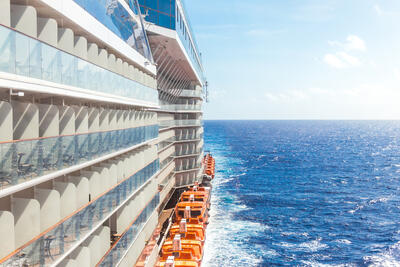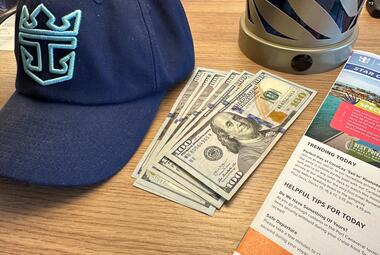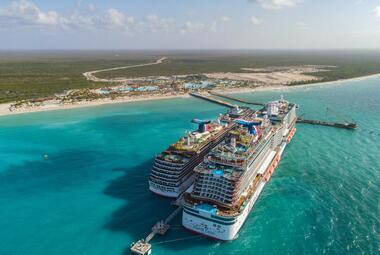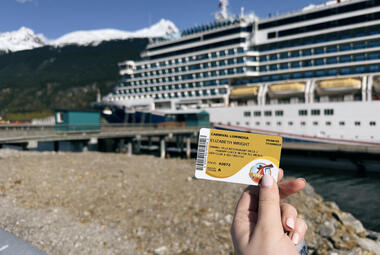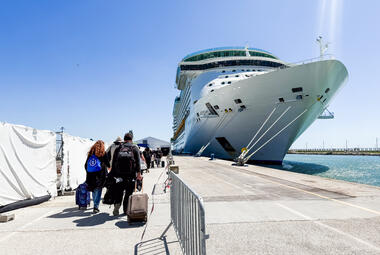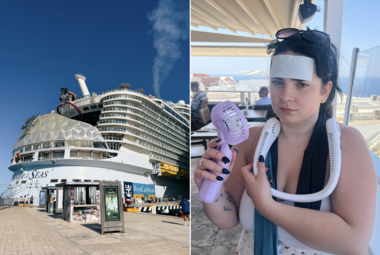From news reports of passengers falling overboard to ships being quarantined due to outbreaks of diseases, one might question if it's safe to go on a cruise.
While there are inherent risks with any form of travel, you can rest assured knowing the cruise lines have implemented safety protocols and health measures to help ensure everyone has a safe and enjoyable experience.
That, however, doesn't mean that you can disregard common sense. While onboard your cruise, you must exercise caution, especially when going ashore.
Here are 14 simple safety tips to help make sure that you have a safe cruise.
Purchase travel insurance
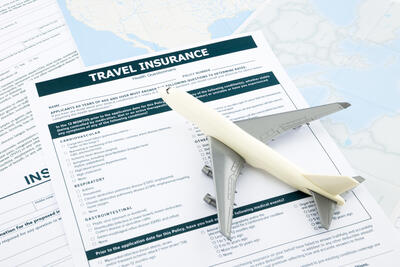
When you book your cruise, you'll be asked if you want to purchase travel insurance, which provides coverage for things like medical emergencies, luggage mishaps, and travel delays to offer peace of mind should any unfortunate events happen during, or leading up to, your cruise.
Though you may not want to shell out the extra money for something you may never need, investing in travel insurance is a wise decision, as it protects you from unexpected expenses during your vacation, as well as circumstances beyond your control that impact your ability to make it to your cruise. This includes things like flight cancellations, lost baggage, a death in the family, and more.
Once the final payment date has passed for your cruise, you'll face penalties should you wish to cancel your sailing. According to MSC Cruises' cancellation policy, if you decide to back out of your voyage 15 days or fewer before the departure date, you'll have to pay 100% of the cruise fare, meaning you won't be eligible for a refund.
Though not every circumstance will be covered, having travel insurance increases your chances of getting reimbursed if you're unable to make your cruise or fall ill during your journey.
Read more: Cruise travel insurance and why you need it
Fly in the day before your cruise is scheduled to depart

Though travel insurance may help reimburse you if you miss your ship due to a flight cancellation or delay, you don't want to be stuck moping in an airport rather than enjoying a tropical cocktail during sailaway.
As someone who resides in North Carolina, I find myself frequently flying to South Florida for cruises to the Bahamas and Caribbean. I don't want to risk missing the ship, so, in addition to flying out the night before, I always make sure that my flight isn't the last departure of the day.
Even if you live within driving distance, it might be worth considering driving halfway the night before, so you aren't in a rush the morning of. If you're in a hurry, you might drive more recklessly than usual. When I sailed on Carnival Elation, for instance, my partner and I drove to Jacksonville, Florida, rather than pay over $400 per person for a flight, since it was a little over five hours away.
Though we could have made the drive the morning of, we decided to leave after work and stay in a hotel about 15 minutes from the terminal. We were able to enjoy a leisurely breakfast and arrive at the ship well-rested!
Read more: The costly cruising mistake newbies make planning their first cruise
Pack over-the-counter medications

When packing for your cruise, don't forget to include some supplies and medications to treat unexpected illnesses and minor injuries. Though your ship will have a medical center onboard, the hours are often limited. Plus, over-the-counter medications available in the shops tend to be more expensive than on land.
While it might seem excessive packing what I refer to as a "mini-pharmacy," it will ensure that you're able to treat any symptoms should they arise. You don't want to waste a whole day onboard feeling crummy and sleeping in your cabin.
Here are some essentials that you should make sure are packed before walking out the door:
- Pain relievers
- Cold & flu medication
- Band-aids
- Sore throat/cough drops
- Eye drops
- Ear drops
- Antacids
- Seasickness medication
Read more: How to make your own DIY cruise first aid kit
Introduce yourself to your cabin steward on embarkation day
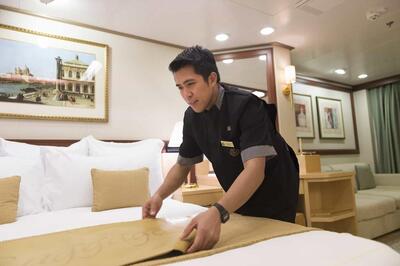
Your cruise cabin steward is the individual responsible for ensuring that you're stateroom is clean and tidy during your sailing. Though they won't do things like organize your vanity full of clutter or rearrange your closet, they'll refresh your towels, empty the trash, deliver disembarkation documents, make the bed, and more.
It's wise to introduce yourself since they'll be coming and going at least once per day. If they happen to notice that you're feeling unwell or that you're routine changes, they'll stop by to ask if everything's okay.
Following a cabin steward's arrest for hiding cameras in guests' cabins, many cruisers have expressed that they'll begin checking underneath their beds and sinks on future sailings. Though your stateroom attendant is trained to ensure your comfort and safety, taking this extra step may help you feel more secure in your home away from home.
Read more: Why you should get your cruise cabin serviced in the evening instead of the morning
Trust your instincts and report any concerns to the ship's crew

If you witness or suspect any misconduct by another passenger or crew member, you won't be reprimanded for alerting the ship to a possible safety concern.
While cruise ships have cameras and security personnel all over the vessel, your vigilance adds an extra layer of security and could help crew members promptly address an issue.
When I was sailing onboard Carnival Elation, I noticed a lot of cruisers carrying drinks onto the dance floor in the nightclub, which was prohibited. Rather than wait for a passenger to accidentally spill a drink, I alerted one of the security guards, who immediately came over and reminded everyone of the rules. It kept the fun going, as we didn't have to stop for any messes to get cleaned up!
Stay hydrated and use sunscreen
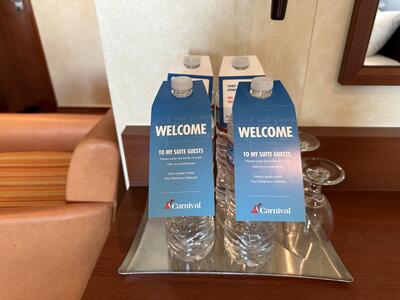
Whether you're cruising to The Bahamas in February or Mediterranean in July, you should be prepared to sweat. Rather than subject yourself to dehydration, make sure you're drinking enough water, both on the ship and while ashore. Those with a drink package will want to pace themselves, as alcohol dehydrates you faster since it is a diuretic.
Personally, I like to pack Liquid I.V. packets, as the electrolytes help rehydrate my body faster than just plain water. Moreover, if I start to feel too warm, I'll take a break from the sun and seek out a little bit of shade.
When in the sun, ensure that you're applying enough sunscreen. If you get burnt, especially on the first or second day of your cruise, you won't be able to fully enjoy the rest of it. Whenever I cruise, I make sure that I bring more sunscreen than I think I'll need, as it's pretty pricey onboard. I've seen it as expensive as $27 for a single bottle on Carnival's private island, Half Moon Cay.
Read more: Unpleasant cruise ship problems you aren't prepared for
Supervise your children

In July 2024, a photo shared to a Facebook group, which was attributed to Liz Pride, showed two children sitting on a cruise ship balcony.
Though cruise ships are safe, it's important to monitor your children to ensure that they aren't engaging in any dangerous behaviors. One wrong move and one of the unidentified kids could have easily ended up falling overboard and getting hurt.
It's also a common courtesy, as nobody wants rowdy or ill-behaved children causing a ruckus during their sailing. If they're running through the hallways or lido deck, they could accidentally bump into someone or slip and fall.
Read more: 13 Things Polite People Never Do on Cruises
Drink responsibly
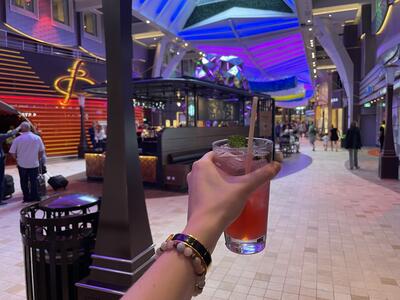
Many cruisers opt to splurge on drink packages during their vacation. For a set price, passengers of legal drinking age can indulge in either a fixed number or unlimited drinks each day of their sailing. While it's certainly okay to enjoy adult beverages, you don't want to test your tolerance too much.
When it comes to issues amongst passengers, drinking tends to be the root of the cause, so you'll want to know your limits. You may also disregard cruise ship rules without even realizing it. If you feel as though you've had one too many drinks, grab some water and head back to your cabin for the night.
Watching your alcohol intake will also help ensure you don't wake up with a piercing hangover that causes you to miss any of the day's activities!
Use your in-cabin safe to store your valuables
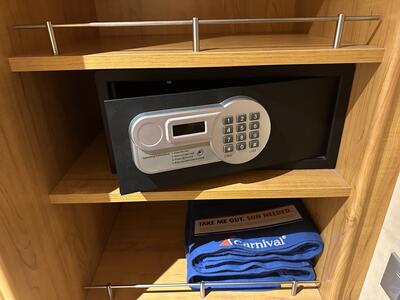
At some point on embarkation day, all guests are given a cruise card or, if sailing onboard Princess Cruises or Virgin Voyages, a small plastic wearable device, that serves as your ID, room key, charge card, and more while onboard.
Though not large enough to store items like laptops, the safe inside your stateroom will be able to hold your wallet, tablet, passport, jewelry, cash, car keys, etc. Whenever I get to my cabin, unloading these valuables is one of the first things that I do since I know I don't have to worry about carrying them around the ship during my cruise.
On the last night, I'm not scrambling to locate which bag my keys or wallet are in. Instead, I know that everything's in the safe, which helps simplify the packing process.
Don't venture into crew-only areas
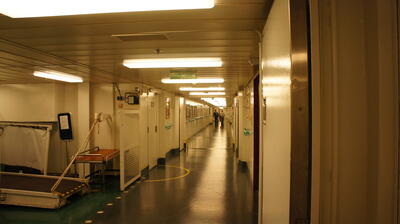
With so many passenger areas onboard to explore, it should be easy to stay out of crew-only areas. If you are interested in a behind-the-scenes look at your ship's operations, consider purchasing a tour. This way, you'll be safely escorted through approved areas, ensuring that you don't accidentally get hurt.
Cruise lines don't ban guests from crew-only areas without good reason. As safety is their top priority, they don't want anyone injuring themselves in the engine control room, galley, etc. Not only that, but cruise ship operations don't get time off. Things are going on behind the scenes at all hours of the day, and wandering passengers could disrupt vital functions.
Crew-only areas also serve as their home during their contracts. Their living accommodations, mess hall, bar, and more give them a chance to step away from their work life and relax. You wouldn't want a client from work barging into your house, would you?
Read more: What are the areas onboard a cruise ship like for crew only?
Wash your hands
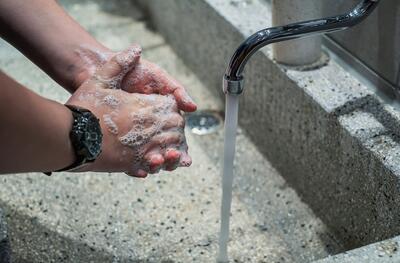
You should frequently wash and sanitize your hands during your cruise vacation. From elevator buttons to handrails and door handles leading into various onboard venues, there are plenty of opportunities for germs to spread.
Washing your hands will help eliminate any germs you may have, for instance, picked up en route from your cabin to the buffet. Personally, I like to rewash my hands after using the communal serving utensils, too. Although I know that I washed my hands before going in, the same cannot be said for everyone.
Thankfully, you'll see crew members cleaning surfaces in high-traffic areas quite a bit. Still, though, it's best to wash your hands whenever you're able.
Read more: 10 tips to make your next cruise healthier
Attend (and pay attention during) the ship's muster drill
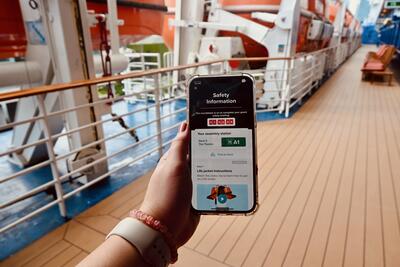
Before you're able to set sail, everyone onboard must complete the ship's muster, or safety, drill. While emergencies at sea are rare, the purpose of the safety drill is to familiarize passengers with their assigned assembly stations, as well as other important protocols.
If you're sailing with a cruise line that has a virtual muster drill, you'll be responsible for watching the safety videos on your own time and then visiting your assembly station within a specified window. Some lines, such as Disney, still have all-ship drills, meaning that all guests will be required to head to their muster station at the same time.
However your cruise line does its muster drill, you'll want to pay attention to the information being shared. Though a true emergency is highly unlikely, all passengers must be aware of what to do to help safely evacuate the ship.
Don't keep large amounts of cash on your person

Since your cruise card acts as your charge card for all onboard purchases, you shouldn't carry an abundance of cash on you. While a few dollars to tip your favorite bartender is okay, leave the big bills in your safe. If you find yourself needing some cash for table games in the casino, run back to your cabin before you make your way there.
Moreover, carrying a lot of cash on your person in port can make you a target for pickpockets and thieves. While you'll want some cash for vendors that don't accept credit cards, it's best to charge as much as possible to your card, especially if you have one that doesn't charge a foreign transaction fee.
Typically, I'll take two credit cards on vacation with me, bringing only one ashore while leaving the other secure in my cabin in case anything happens to the one I'm carrying.
Read more: Where to keep your cruise card, phone, and cash during a shore excursion?
Never invite strangers to your cabin
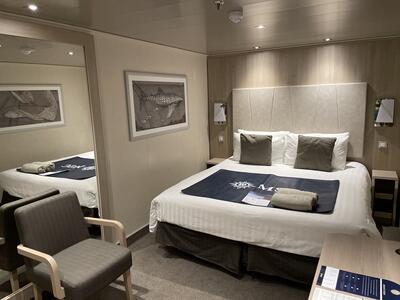
I've been on plenty of solo cruises and made friends by striking up conversations with those next to me at dinner, as well as attending various onboard events. Though they're a great opportunity to meet and mingle with those from different walks of life, it's still important to approach new friendships with caution.
Since there aren't any security cameras found in guest cabins, those with negative intentions are more likely to take advantage of unsuspecting passengers behind the privacy of a stateroom door, especially if drinking has been involved.
You should prioritize your safety and well-being as much as the cruise line. While you may feel like it's okay, it pays to be cautious and avoid putting yourself in any potentially unsettling situations.


